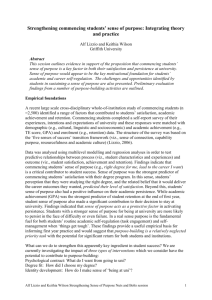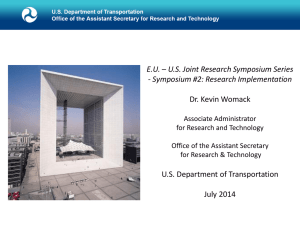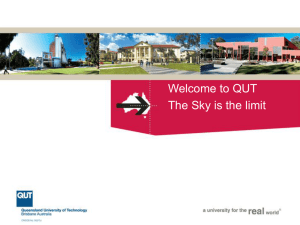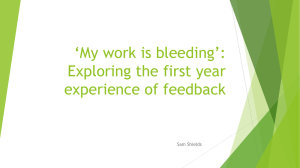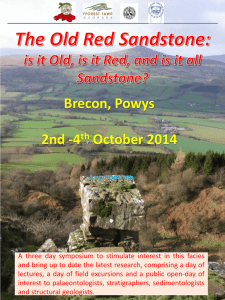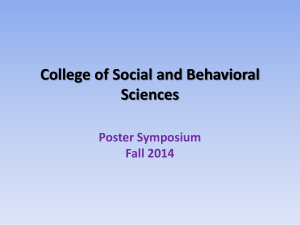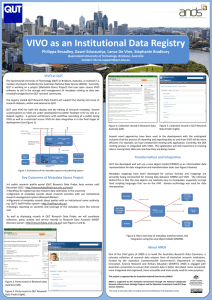Understanding Student Diversity ( PPT 458k)
advertisement
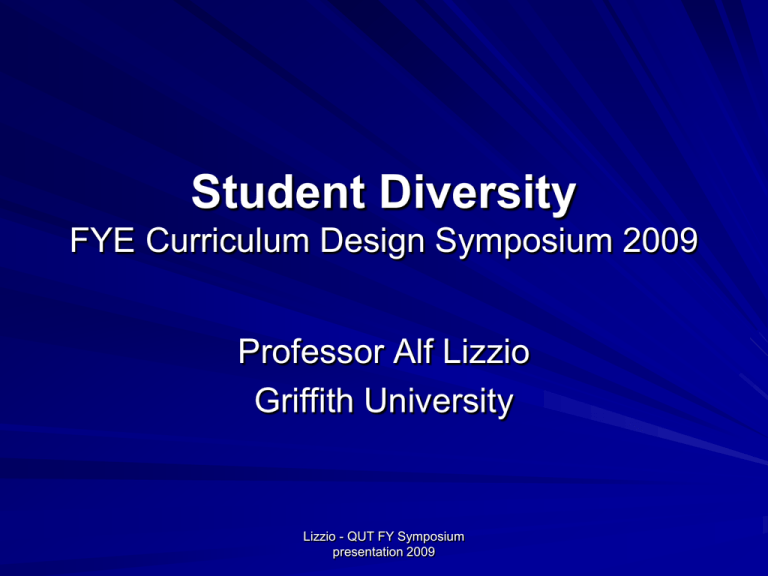
Student Diversity FYE Curriculum Design Symposium 2009 Professor Alf Lizzio Griffith University Lizzio - QUT FY Symposium presentation 2009 Overview: What will we cover? How are students different? What are typical responses and emerging narratives to student diversity? What do we know about ‘diversity friendly’ cultures? How do we design with student diversity in mind? What activities are transition supportive? Lizzio - QUT FY Symposium presentation 2009 Transition into University: How are students different? Student Diversity Cultural Gender Economic Generational Linguistic Disability Pathfinding Student Participation Factors Personal situation Structural settings Institutional culture Local culture Student Success Engagement Achievement Inclusion Transformation Lizzio - QUT FY Symposium presentation 2009 Student Learning Resources Appraisal Motivation Ability Capacity Fit States of Diversity: What are some typical responses? 1. Denial 2. Frustrated awareness 3. Tolerance 4. Remediation 5. Active engagement 6. Inclusive social change Lizzio - QUT FY Symposium presentation 2009 A Tale of two Paradigms: What are our academic narratives? Traditional Teacher Centred Conception Emerging Student Centred Conception Teaching and delivery Design and facilitation Separation of academic and pastoral Integration of academic and pastoral Silos Partnerships Social Darwinism Shared responsibility Student deficits Student resources Lizzio - QUT FY Symposium presentation 2009 What makes a difference: What do we know about ‘diversity friendly’ cultures? Identity markers and touch-points Safety and respect Inter-group interaction Efficacy expectations Assumption testing-two-way Self-management of leaders Policy-practice alignment Breaking of the student diversity-quality nexus conflation Conscious design and necessary structure Flexibility and responsiveness Identifiable support pathways/navigation beacons Lizzio - QUT FY Symposium presentation 2009 Designing for Diversity: What are some options? A. Preparatory Access Preparation Semester B. Supplemental-remedial Course/Subject C. Complementary Academic subjects Parallel enabling courses or experiences D. Integrated Inclusive Learning Community Lizzio - QUT FY Symposium presentation 2009 Key Propositions: What do we know from the literature? Departure is not destination: ‘Time on task’ is the key predictor of academic success. Relationships are ‘protective’: Investing in community building pays off. Success may be a revolving door: Student retention/attrition is an over-determined phenomena and require multiple attempts. Students cannot live by support alone: ‘More support’ is not necessarily ‘effective support’--both challenge and support are required Those that need often don’t ask: Paradox of student help-seeking Lizzio - QUT FY Symposium presentation 2009 Practical Magic: What are ‘transition-supportive’ goals? Perceived relevance Developing ‘early efficacy’ as a learner Active engagement in the learning community (tasks, roles and settings) Enhancing self-regulation Facilitating higher-order learning Mutual responsibility Lizzio - QUT FY Symposium presentation 2009 Practical Magic: What activities are ‘transition supportive’? Peer mentoring Group work Project work Authentic assessment Variety of learning tasks/modes Community building Surfacing un-discussable/taboo topics Formative feedback and feed-forward Self-assessment of approaches and skills Process reviews Lizzio - QUT FY Symposium presentation 2009 Take away message Ultimately what we do and how far we are prepared to go depends on the extent to which we believe in our students! Lizzio - QUT FY Symposium presentation 2009
